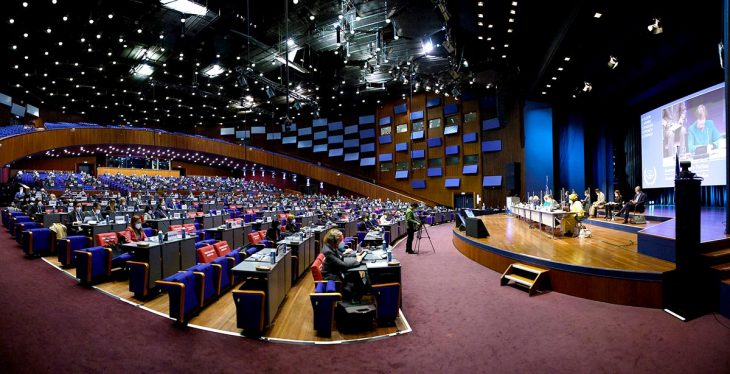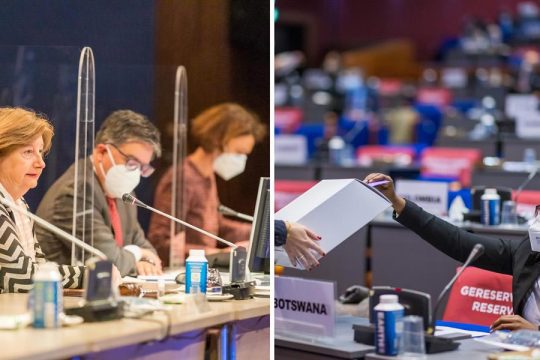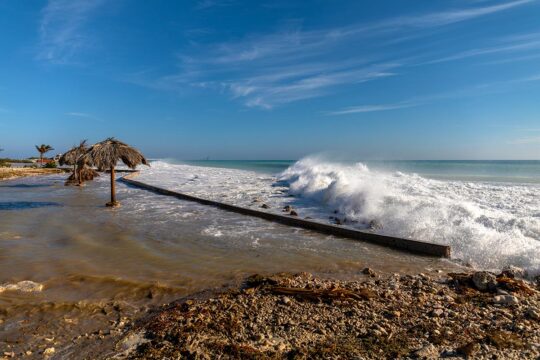With a symbolic burgundy ribbon on her lawyer’s robes, Mylène Dimitri, lead counsel for Alfred Yekatom in one of the Central Africa cases at the International Criminal Court (ICC), appealed to the president of trial chamber, judge Bertram Schmitt, this week, asking for his intervention in lobbying for “respect and fair treatment’” for defence teams.
When compared with the pay and conditions on court staff, we are “effectively working an extra 30% for free” she told him. In an alarming motion, the defence lawyer requested on 1 December no less than the suspension of the hearings of the Alfred Yekatom and Patrice-Edouard Ngaïssona trial, due to lack of resources.
As states go into their annual huddle next week and decide the next year’s budget, defence is one of the many pressure groups asking for more money, pleading for an increase in a budget that currently is just above 150 million euros. “Our renumeration has not been reassessed since 2013. The equality of arms principle is jeopardised at the ICC today”, says Jennifer Naouri, the immediate past president International Criminal Court Bar Association.
But others include civil society pressure groups, lobbying for better access to justice for victims: “You can spot the continued consequences of chronic underfunding”, says Maria Elena Vignoli from Human Rights Watch. “Nigeria’s preliminary examination was concluded two years ago by the previous prosecutor,” she notes, “but Bensouda decided to shelve it in part because of lack of adequate resources. And the situation has been in limbo ever since.”
And there’s no sign within the prosecutor’s budget proposals for next year of “any change of heart”. Even “the deprioritisation of the investigation into crimes allegedly committed by U.S. forces and the former Afghan government was justified by the current prosecutor, in part, by an effort to manage the limited resources that are at his disposal,” Vignoli says.
30 million euros more
This year the Office of the prosecutor (OTP) has come cap in hand with a request for a substantial increase of 26.6% from states. They say they already have felt inflationary pressures and end of year travel missions have been cancelled.
And it seems that this year has been full of previously impossible things. For the past decade, the ICC budget discussion have been dominated by a powerful pressure for zero nominal growth. The limited budget and grudging negotiations symbolized states’ lack of trust in the court’s effectiveness and efficiency. But this year, after agreeing to major changes as identified by an Independent Expert Review, officials at the court have expectations.
After a year of activities at an “unprecedented level” as outlined in the Court's annual report on activities, including three trials opening and two trials continued; three new arrest warrants issued and a fourth one unsealed; one suspect was transferred; two new investigations were opened, bringing the number of open situations to 17; and four preliminary examinations were concluded, the court plans for four new active investigations in 2023 and at least three simultaneous trials.
The whole court has asked for a 20.6 percent increase, or some 30 million euros more.
Unprecedented Ukraine referral
Ukraine is the second key to explain these new expectations. Since the referral of the situation by an unprecedented 43 states, the court has been front and centre in coordinating investigations into alleged war crimes and crimes against humanity.
The combined consequences of the war in Ukraine and of the mobilization of the States has brought “both challenges and opportunities” says Vignoli, for a court that would like to have the means to play its role of the “the cornerstone of the international justice ecosystem”, but it has also “really highlighted the unevenness in victims’ access to justice”.
In the weeks after 24 February, the court has been flooded with cash and secondments. That money has been siphoned into a trust fund and dispatched into three specific areas: technology upgrades, work on sexual and gender based crimes and trauma-informed investigations. The current total in the fund is around 15 million euros. And the 74 secondees provided by state parties are being spread around different OTP teams.
Generosity: no substitute for proper funding
But states parties have had to be told in the run up to this year’s assembly that their generosity is no substitute for properly funding the general budget, as the ICC registrar told diplomats at a meeting in November. The president of the ICC – himself formerly judge and president of the court – has been “quite adamant” about how “an injection of resources in the Office of the prosecutor would generate work down the line, the other all the other court organs”, says Vignoli.
That’s not the only risk though of the enthusiasm of the Ukraine. The states’ own Committee on Budget and Finance has pointed out that there is a danger that “voluntary funds may also lead to asymmetrical growth if the OTP alone has the additional resource”. They describe the OTP as becoming more “efficient and agile” via its additional funding but point out “this could lead to an increased caseload for Court” and wonder where the funds will come from. In the long run, the conclude, voluntary contributions are not a sustainable funding model.
“Perceptions of politicisation”
The most problematic aspect of it is that they may reinforce “perceptions of politicisation”, says Vignoli. “In the messaging around the various pledges that were made, states were not always that careful, and they often made the link between their contribution and Ukraine, thus creating this perception of politicisation or selectivity in the court's work”.
Human Rights Watch wants “a firm rejection of the use of voluntary contributions as a funding model, because we are afraid that we are getting, you know, towards a sort of a slippery slope where that becomes something that is resorted to on a more regular basis,” she says.
ICC sources point out that the Committee on Budget and Finance recommended 16% increase is already half eaten up by inflation. Many officials would love to see a multi-year commitment from states that would remove some of the unpredictability of the annual process. Against the backdrop of inflation and many other budgetary pressures, it’s difficult to predict how exactly the budget negotiations will finally end.
“I am very worried”, says Naouri “because the court is taking on more cases. It is extremely worrisome that that we are losing sight that it's a court of justice and a court of justice is about trials. And trials are the part about the lawyers doing the work, the lawyers of the OTP, the lawyers of the defendants and the lawyers of the victims. And these have to be the priority in the budget of a court. And that is the worrisome part. Very, very worrisome”.
Diplomatic sources suggest that there is such strong domestic pressure currently, to see justice done for war crimes in at least the Ukraine situation, that despite the difficult economic circumstances, the court will get an increase. But how much is still being negotiated in the corridors of The Hague.








